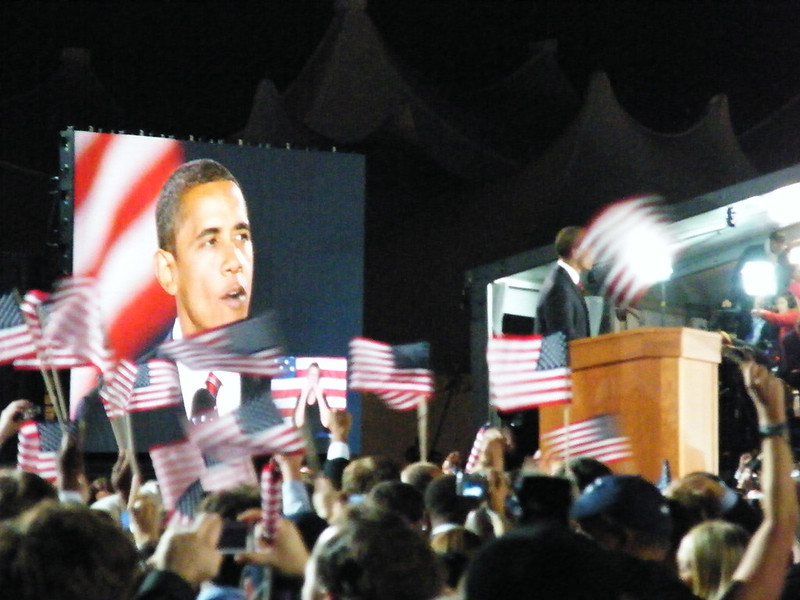Title: Title Barack Obama Rally in Grant Park November 4, 2008 Source: Flickr : Author Piersall : Licence Creative Common V2.0
Date: 4th November 2008
Place: Grant Park, Chicago, Illinois
Word Count: 2,060 words
Length: 16 minutes 30 Seconds
Pace: 124 words per minute
Transcript: The full text of Barack Obama’s victory speech
On November 4, 2009, Obama was the 44th person to be elected president of the United States. His campaign was well-crafted, with a simple and powerful catchphrase: ‘ Yes, we can.’ Approximately 240,000 people were present when Obama gave his acceptance speech under the night sky in Chicago. Many millions listened and watched around the world.
I sat up late into the night here in the UK to hear it. It was magnificent, beautifully written, and expertly delivered. It captured the mood of a nation looking for change, hope and peace.
There is so much to learn from this speech. Lasting just over a quarter of an hour, it uses many clever writing techniques, making it one of the greatest speeches of all time.
The Opening
Any good opening sets the tone, introduces the subject, hooks an audience in, and makes them want to hear more. The first paragraph is a well-hidden direct address and rhetorical question.
He addresses those without hope, telling them that change is coming.
“If there is anyone out there who still doubts that America is a place where all things are possible; who still wonders if the dream of our founders is alive in our time; who still questions the power of our democracy: Tonight is your answer.”
Having told those he addresses that they have the answer, he emphasises by making three statements, starting with, ‘It’s the answer…’ This is a beautiful use of repetition, which makes the ideas flow and gives them clarity.
Using anecdotes and imagery, he conjures up a social revolution by the people for the people. Within those first two minutes, his message of hope and change is well established.
What follows are eloquent references to the people involved in the campaign on both sides. They are considered humble and compassionate.
Examples of standard building blocks of speech writing
This is a great speech; like all great speeches, it contains the basic rules and techniques of good writing.
Repetition
“But above all, I will never forget who this victory truly belongs to. It belongs to you. It belongs to you.”
This gem provides repetition and imagery to create something powerful. Also, notice the rule of three. Use it; it works.
“It was built by working men and women who dug into what little savings they had to give 5 dollars and 10 dollars and 20 dollars to the cause.”
Alliteration
Obama uses alliteration extensively throughout the speech. This technique is applied skilfully and does not appear overused.
“…hatched in the halls…”, “It began in the backyards…”, “…if America’s beacon still burns as bright…” and “…people who braved the bitter cold…”
Specific
When he describes things, he is specific, not general.
“…the living rooms of Concord and the front porches of Charleston.”
Call to action
Several calls to action and phrases demand a reaction from the audience. His iconic slogan, “Yes, we can,” is one. The one below is slightly more subtle, but “… we will get there” triggers the call. Some may see it as manipulative, but ask yourself: Is a speech without reaction a great speech? However, most political speeches need a response from the audience; otherwise, they appear dead.
“But, America, I have never been more hopeful than I am tonight that we will get there. I promise you, we as a people will get there.”
Notice he also starts with “But, America…” referencing the country in front of a patriotic crowd sets the tone for what follows.
Antithesis
“…we cannot have a thriving Wall Street while Main Street suffers.”
The ending
As Obama draws to a close, we see a mastery of speech writing. He references a 106-year-old woman named Ann Nixon Cooper, describing her standing in line and casting her vote: “…she touched her finger to a screen…” This allows him to describe what she must have seen over a lifetime spanning more than one hundred years: the triumph of humankind, for example, the moon landings, the civil rights movement, political reform, and more.
It is hard to imagine a better beginning to a presidency. Indeed, he made it a hard act to follow. However, on that cold autumn evening, there was no doubt his audience believed that real change and reform were coming, and this speech captured that mood.

